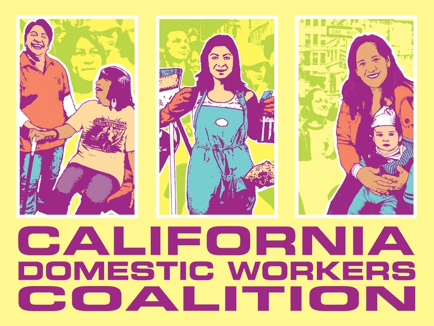***FOR IMMEDIATE RELEASE***
Contact: | Megan Whelan, megan@cadomesticworkers.org California Domestic Workers Coalition (CDWC) (415) 993-4964 |
June 28, 2019
Domestic Workers Win Landmark Program to Strengthen Labor Rights Compliance in California
After a multi-year grassroots campaign, domestic workers and employers of the California Domestic Workers Coalition have won the resources within the California State Budget to establish a groundbreaking outreach and education program to be administered by the California Division of Labor Standards and Enforcement. The aim of the program is to increase awareness of and compliance with existing labor protections within the domestic work industry.
“Today we celebrate Governor Gavin Newsom and the State Legislature’s unprecedented steps to protect the rights and dignity of domestic workers in California,” says Kimberly Alvarenga, the Director of the California Domestic Workers Coalition. “By establishing this landmark program, California is taking seriously the legacy of exclusion from labor protections within the domestic work industry.”
Building on the demonstrated success of more than a decade of community-led outreach to domestic workers and employers, the program will promote the innovative collaboration with community-based organizations (CBOs) to conduct the education and outreach program. As they are rooted in and maintain trust with impacted communities, CBO’s have been recognized to most effectively reach and implement the rights of domestic workers and other vulnerable low-wage workers.
Domestic workers help keep our economy strong and deserve the same labor protections as everyone else,” states Assemblymember Phil Ting, who has been the legislative champion for the program since it was first introduced last year, “Providing education and outreach to this underrepresented workforce about their rights will help achieve parity, and I’m excited to see the state put resources into these valuable efforts.”
Domestic workers, who are primarily immigrant women in California, provide child care, house-cleaning, home care and attendant services for more than 2 million households across the state. Unfortunately, because they have long been excluded from basic labor protections and because they work in isolation behind the closed doors of private homes, domestic workers have been uniquely vulnerable to workplace violations, lacking written work agreements and basic information about their rights. They share frequent violations of wage and hour laws, sexual harassment, and retaliation, yet under-report due to fear, especially under the current national climate of anti-immigrant policies and rhetoric.
At the same time, domestic employers are unlike other types of employers. Anyone can be a domestic employer, and many people hire during a major life transition. At any point, one can realize the need to hire a nanny, housecleaner or a personal attendant and could do so without preparation or having any knowledge about their responsibilities as an employer. According to a 2016 study by the UCLA Labor Center, less than half of domestic employers actually conducted research to understand their responsibilities when setting the conditions for hours, pay, and benefits of the worker.
This program will bring clarity to not only workers but also to employers. “We know that domestic employers often want to comply with the law, but they may not know what those standards are, or where to find the right information. The absence of clear standards leads to wide variations in work and pay arrangements which can lead to wage and hour violations,” said Lindsay Imai-Hong, the California Organizer for Hand in Hand: the Domestic Employers Network, “We celebrate the creation of this program to bring much-needed guidance and information on labor standards and fair employment practices because that information is not just for domestic workers and what they need; it is also about domestic employers and what we need.”
After winning the California Domestic Worker Bill of Rights in 2013, AB 241 (Ammiano), and making it permanent in 2016 through SB 1015 (Leyva), domestic worker-led organizations across California have continued organizing from the State Capitol to their local neighborhoods to make those rights a reality in their every-day lives.
“Before I knew about my rights, I worked for 7 days a week, 11 hours a day, cleaning houses in San Francisco for just $2 an hour. Now, thanks to The Women’s Collective of San Francisco, I know my rights and how to negotiate for better pay,” states Ericka Chavez, a member leader of the Women’s Collective, one of the leading organizations of the California Domestic Workers Coalition, “I believe this statewide program and the partnership with trusted community-based organizations is necessary to reach and educate the hundreds of thousands of domestic workers across California who are just like me. Si Se Puede (yes we can)!”
For more information, please visit www.cadomesticworkers.org.
###
The CDWC is a statewide coalition consisting of organizations working to advance the dignity and respect for Domestic Workers and their families. The organizations that are a part of our steering committee include: ALMAS of the Graton Day Labor Center, Coalition for Humane Immigrant Rights of Los Angeles, Filipino Advocates for Justice, Hand in Hand: The Domestic Employers Network, Instituto de Educación Popular del Sur California (IDEPSCA), Mujeres Unidas y Activas, Pilipino Workers Center, and The Women’s Collective of Dolores Street Community Services.
